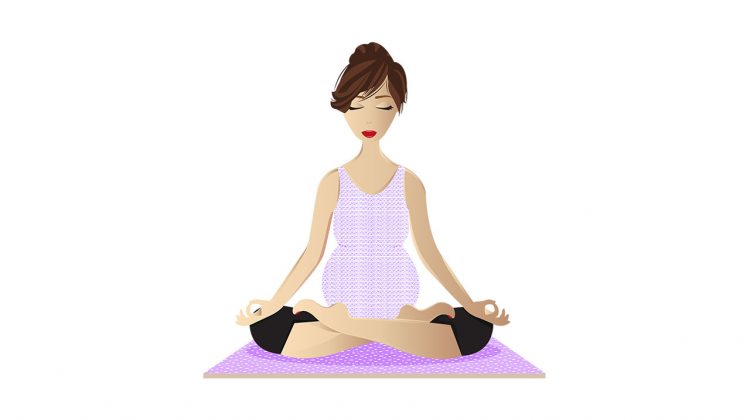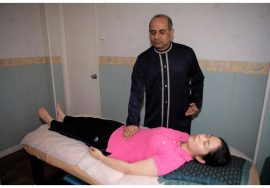
AYURVEDA FOR FERTILITY AND PROCREATION – WOMEN’S INFERTILITY ISSUES
In this series of articles on the subject of Fertility & Procreation, after discussing infertility in men and sharing some solutions/guidelines from Ayurveda, here we share some information from Ayurveda regarding infertility issues affecting women.
It is important that both partners are in good health before trying to conceive a child, because the quality of sperms in men and quality of eggs in women directly affect conception and influence the health of the forthcoming child.
However, Ayurveda does place more importance on the health of the female partner, on all levels, i.e. physical, mental, emotional and spiritual, more so than her male partner, because she is the one who is going to carry and nurture the baby in her womb for nine months.
The woman’s consciousness and emotional wellbeing has a direct influence on the health and character of the child. Therefore, the consciousness, mental thought process, emotional feelings and physical health of the woman before, at the time of conception and during pregnancy, is of great significance.
Ayurveda considers conception a to be a great event in a couple’s lives, therefore it should be well planned and prepared for, instead of being an act of mere passion or natural sexual instinct. There are many wonderful guidelines given in Ayurveda for both men and women, which can help them to conceive a healthy child. A couple can even maximize the chances of conveiving a child of a particular gender by following certain guidelines before conceiving, as well as increase the chances of a normal delivery of the baby.
Since the woman’s role is more significant in this regard, there are more guidelines given for women in Ayurveda, and those can be divided into three categories, i.e. before conception, during pregnancy and after pregnancy.
First, let us discuss briefly some common issues/difficulties faced by women with regard to their fertility and what can be done to mitigate them.
PMS: Premenstrual syndrome is becoming a big issue for many young women in modern society, due to wrong eating habits and inappropriate lifestyle. There are some solutions given in Ayurveda which can help to resolve many issues associated with PMS, i.e.
- To regulate periods, women can take the following : Mix 1 – 1 ½ inch size fresh grated ginger, ¼ teaspoon black pepper powder, ¼ teaspoon rock salt, ½ teaspoon cumin seeds powder, ½ teaspoon fresh lime juice and 4 – 5 pieces of fresh mint leaves. Mix them well and keep in a glass bowl with a proper cover. Leave this mixture to ferment for about 1.5 hour (for 2 mahurats – 1 mahurata is of 48 minutes) in the morning and consume it 15 minutes before lunch or while having lunch. Chew it well. This formula can help women to regulate their menstruation.
- To correct and prevent cramps before and during the menses: Use hot water bottle on the lower abdomen and on the lower back for a few minutes. Then use sesame oil (black sesame oil in cold weather and white sesame oil in hot weather), or mustard oil, or virgin coconut oil or castor oil for rubbing gently on the lower abdomen, groin area and on the lower back. This will facilitate proper air circulation in those areas and can help to ease the menstrual flow, which will reduce the pain and discomfort.
- Excessive and heavy bleeding during periods: To correct this problem, Ashoka powder is recommended in Ayurveda. Please refer to our blog on Ashoka for detailed information.
- To prevent dark clots: this symptom/issue has become very common amongst today’s young girls/women. One of the main reasons, according to Ayurveda, for having clots on the first and second day of the menses is because the uterus is not cleansed properly/completely in the previous month, and the dead blood cells which remain inside the uterus are released in the subsequent month in the form of clots. Due to this, most women feel pain and cramps in the lower abdomen, because the passage through which the menstrual blood flows is narrow, and when clots are released through that passage, it can cause severe pain. Ayurveda recommends a very simple and unique remedy using cumin seeds. If 1 teaspoon of cumin seed powder is taken with about 200 ml warm water, half hour before breakfast, for three consecutive days, on the 3rd, 4th and 5th day from the start of the menses, it helps to cleanse the uterus completely and thus prevent clots.
- Acidic cervical fluid: This symptom is also very common nowadays. Because it is very common, many women do not feel it is necessary to do something about it.
I tell my female clients who have this problem, that many things are common in current times, but that does not make it normal & it should not be ignored, otherwise it can become the cause of many serious problems.
If the cervical fluid is acidic, it can cause difficulty in conceiving, because sperms cannot survive in an acidic environment.
To correct this problem, a basic thing that women can do is to reduce the intake of sweets, particularly white sugar. Secondly, they should take a herbal tea made with cumin seeds, coriander seeds and fennel seeds. Mix ½ teaspoon of each in about 500 ml warm water and boil it on a medium flame till the quantity of water is reduced to about 200 ml. Then strain the water and drink it whilst it is still warm. It can be taken 1 – 2 times a day, depending on the severity of the problem.
The ideal time to take this herbal tea is 4:00 pm. If it is to be taken twice then it can be taken again at about 9:00 pm in the evening, one hour after dinner and 30 minutes before going to bed.
Another herb which is recommended in Ayurveda for correcting this abnormality is “Shatavari” (Indian Asparagus). Please read our blog for more details on “Shatavari”.
Preparations before conception:
- Consume more alkaline food, i.e. fresh green vegetables and seasonal fruits; reduce intake of sweets, particularly items made using white/refined sugar, stop eating deep fried and preserved food, stop eating nuts after sunset and do more stretching exercises during the day. Yoga postures like Badhakonasana (butterfly pose), Bhujangasana (cobra pose), Shalabhasana (locust pose), etc. can be very useful for improving blood circulation in the pelvic region and thus improving functioning of the entire reproductive system.
- Eat very light on the evening when you plan to try for conception.
- Make sure your bladder is empty before trying to conceive, so that you don’t need to get up immediately after intercourse for emptying the bladder.
What should a woman do after sexual intercourse?
- She should lie down on her right side for at least 24 minutes, to activate the left nostril for breathing in and out. This will help to enhance “Kapha” dosha (water + earth elements) in her body and thereby increase the chances of conception.
- Do not go to empty the bladder at least for 24 minutes after intercourse in order to prevent the release of semen and cervical fluid from the vagina, which may naturally happen due to pressure put in that region while urinating.
Do’s & dont’s for a woman after conceiving, and immediately from the time after trying to conceive:
There are many guidelines given in detail with elaborate scientific explanation for each guideline in Ayurveda.
Here we are sharing some basic guidelines for the benefit of our readers:
- Women should not run, jog, walk too fast, jump from a high level to a lower level, after trying to conceive. Also, once conception takes place, these should not be done for at least the first three months.
- Avoid sleeping on the back. Sleep sideways, preferably on the left side.
- Avoid consuming papaya, mango, melons, radish, eggplants, red chili, etc. at least for the first 3 months of pregnancy.
- Eat more bananas, sweet potatoes, carrots, and other root vegetables during pregnancy.
- Take Ayurvedic health supplements like Prawal pishti, etc.; and Bio-Chemic salt remedies loke Ferrum Phos 6x, Calc Phos 6x and Calc Flour 6x, for increasing and maintaining iron level and muscle tone. These health supplements will help with proper overall growth of the fetus in the womb.
- From the third month onwards till the end of the eighth month, the pregnant woman should take 20 grams of an Ayurvedic special ghee (clarified butter) called “Som Ghrit” or “Som Kalyan Ghrit”, either with food or by mixing in hot milk/drink. This unique formula is very potent. This ensures a natural and overall growth of the fetus in the womb. This ghee has an especially positive effect on the intellect of the baby.
- Recommended Yogasanas during pregnancy: Vajrasana (thunderbolt pose), Badhakonasana (butterfly pose) – to be done right after meals, for 8 – 10 minutes each. Padmasana (lotus pose), Sukhasana (easy pose), Cat stretch and Shavasana (corpse pose). Anulom-Vilom pranayam (alternate breathing).
- Inversions, like shoulder stand, head stand, etc. preferably should be avoided during pregnancy, at least for the first 3 months, and after that, it should be done very carefully under the personal supervision of a qualified and experienced Yoga instructor.
Do’s and don’t’s for a woman while approaching the delivery date, and after delivery of the baby:
- Do more walking and light exercises, i.e. stretching exercises.
- Should not sit on a chair with her legs dangling/hanging down for a long time, otherwise the umbilical cord can get wrapped/coiled around the neck of the baby, which can be very dangerous for the baby at times.
- Preferably sit on the floor (on a mat) with proper back support to the spine.
- After delivery, feed the first breast milk to the baby. This works as a nectar for the baby.
- Drink herbal tea, using cumin seeds, fennel seeds, fenugreek seeds – ½ teaspoon each and ¼ teaspoon of cardamom seeds powder, boiled in about 250 ml water for 7 – 8 minutes. Consume after straining it, whilst it is still warm. This can be taken 2 – 3 times a day. This simple herbal tea can help to remove excess air from the womb and help with easy lactation, and can also improve the quality of breast milk.
We hope our readers will take advantage of this information and benefit from the ancient wisdom of Ayurveda.
To book an online appointment at Ayuryoga, with our Ayurveda/Yoga Expert Mr. Vinod Sharma Hong Kong please click here.
DISCLAIMER: This information is intended for educational purposes only & does not constitute expert medical advice, nor is it meant to replace medical recommendations by a medical practitioner. Always consult a qualified Ayurveda Doctor/Health Professional/Yoga Guru for your specific medical needs before taking any herbal health supplements, and/or practicing Ayurveda & Yoga.












